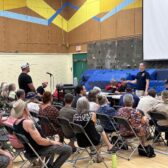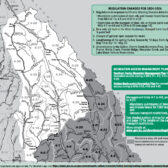City’s lack of affordable housing affecting business, one owner claims
The endemic lack of affordable housing in the city is beginning to hurt the business community says one long-time business owner.
Howie Ross, the owner of Urban Legends and Eclectic Circus, has employees who cannot find housing in Nelson and, because of the transit schedules, need to leave work before normal business closing hours.
As a result, he cannot find enough staff from the endangered labour pool of Nelson because people cannot secure affordable housing in the city, and are not able to stay for very long.
“This definitely affects my businesses,” said Ross about the lack of affordable housing.
“At my businesses we pay above minimum wage and we provide all full time employees with additional medical benefits, including massage, dental, acupuncture. Yet the ‘Help wanted’ sign has become a permanent fixture in the store window.”
Lack of affordable housing affects everyone, even those people who have secure housing and secure jobs, he added. Young people, who have either grown up here or who have relocated, are already being squeezed out.
“My experience, having owned businesses in this area for the past 13-plus years, is that young people are out and about and tend to spend their disposable income and shop locally,” Ross said.
“Typically, people who move here and can afford housing in this market already have their needs met in terms of purchasing. I’ve heard others say that many of these people are older, don’t tend to go out that much, and bring many of their belongings with them. In other words, they don’t shop locally or contribute to the vibrancy or economy of downtown Nelson to the same degree.”
The vibrancy and the “cool factor,” as well as the reputation that Nelson enjoys as one of the best arts and culture towns in the nation, will evaporate, said Ross, if nothing is done to alleviate the problem.
“We need to attract and support young people to be able to live a healthy, fulfilling life here and be able to raise their families in Nelson,” he said.
One of the sideline issues to affordable housing in Nelson is the deep and pervasive issue of poverty in the city.
According to the Nelson Committee of Homelessness, single parent households make up over 12 per cent of Nelson’s population (50 per cent higher than the rest of the Regional District of Central Kootenay) and their average household income is just $31,000.
At the affordable housing measurement of 30 per cent of income, they can afford $777 per month for rent and utilities. The average advertised cost of a two-bedroom rental apartment was over $1,000 per month, and for a house, over $1,200 per month in Nelson.
People living in poverty are also affected by both the cost of housing and the lack of affordable housing in Nelson. Last year the city had one of the lowest vacancy rates in the province.
Typically, Nelsonites have a much higher utilization rate of social assistance than other major communities in the West Kootenay (53 to 86 per cent higher), with 35 to 77 per cent higher unemployment (2012 BC Stats).
People who access social assistance receive $610 per month. This is for rent, utilities, food, clothing, transportation and basic health and personal necessities. These low rates, combined with the cost of housing in Nelson, are contributors to people’s poverty.
Food costs have also risen at twice the rate of the average cost of living in B.C. over the last four years.
But the province claims it has committed $855 million this year to support the construction of rental housing throughout British Columbia, in addition to other housing affordability actions.
Rich Coleman, Minister Responsible for Housing, said the province has six aims in regards to housing, including increasing the rental supply.
However, no detailed plan of construction or what might be in store for Nelson and the West Kootenay was available from the ministry.
In a statement released two weeks ago, Coleman said in “the coming months, we will announce additional measures to address housing affordability challenges and supply.”
Ross said the city needs to support the agencies that do provide affordable housing and the projects they are currently working on.
In the short and immediate term, the city can stimulate and encourage housing by forgiving hook up fees and give tax breaks to people with laneway houses, basement suites and give breaks to developers who want to participate in creating affordable housing, not high end housing, he explained.
“It’s very expensive to build new housing,” Ross said. “Perhaps the city can donate some land and give incentives to developers for affordable housing. There are many people working and talking about this issue. They meet and talk about this all the time and yet, there is not much happening, other than the work the non-profit agencies are involved in. The federal, provincial and municipal governments all need to fully participate in the solution.”
For over two months during the summer the city employed a researcher in development services to examine the short-term rental (STR) market. With an estimated 120 listings in the short-term realm in Nelson — and up to 40 of them quite active — the majority of them were considered illegal by virtue of the fact they lacked a business licence and were not in compliance with zoning, said city researcher Alex Thumm.
But the majority of passion behind the issue of short-term rentals has been around the long-term housing question — or the lack thereof.
However, Thumm found the connection between an almost zero per cent vacancy rate in Nelson and a rise in short-term rentals was a very difficult thing to prove. The city does not have the resources to do it, he contended.
“But the most common argument from short-term rental operators is that, yes, they were former landlords, but they are never going to go back,” he told city council back in August.
In terms of what is happening in the city of Nelson it’s really just observations, Thumm pointed out. There are no hard numbers and costs related to the effect of short-term rentals on the long-term rental market in Nelson.
“We don’t really have concrete, defendable evidence other than anecdotal evidence around the relationship between short-term rentals and housing, at least within the city of Nelson,” Thumm said.



























